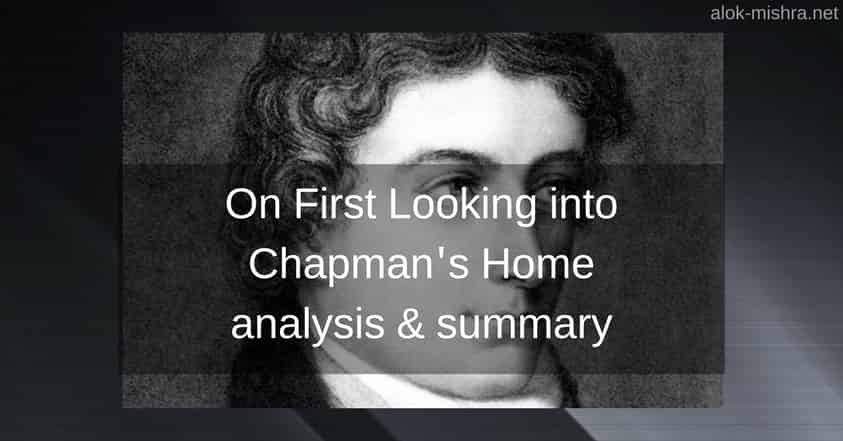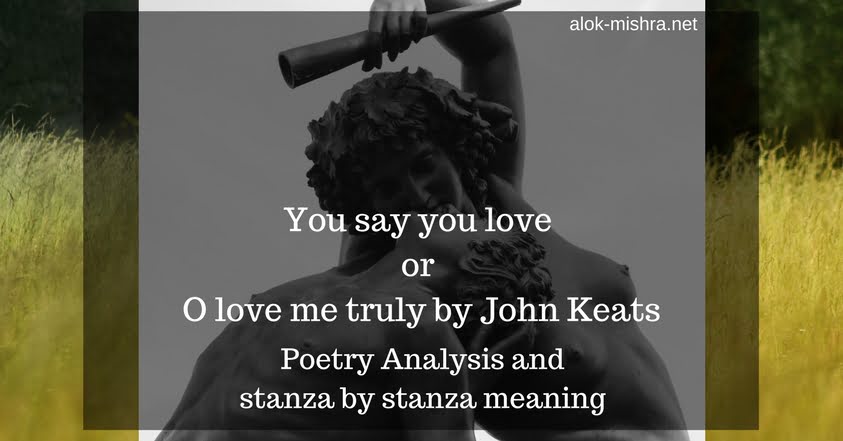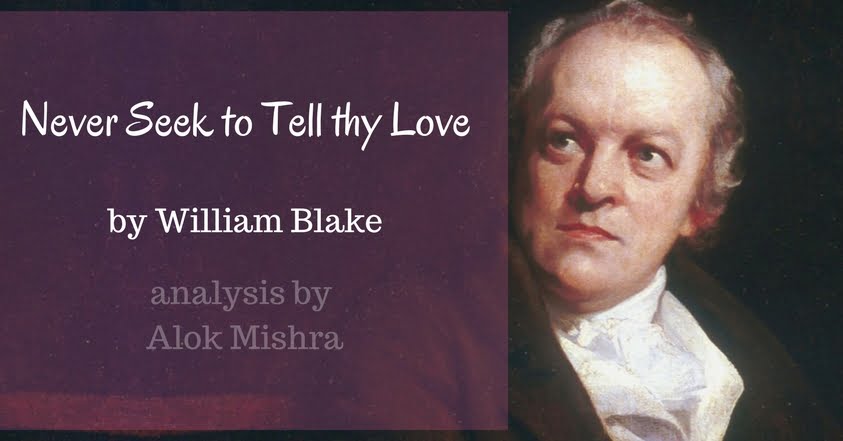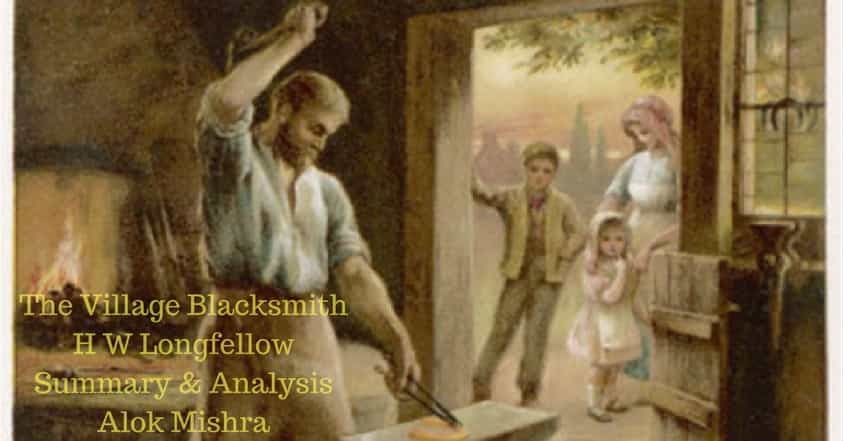"You say you love; but with a voice" is a love poem by John Keats…
On First Looking into Chapman’s Homer – Summary & Analysis
On First Looking into Chapman’s Homer is a very famous sonnet written by the celebrated romantic poet John Keats. It was composed in October 1816 by the poet and the inspiration for the poem came to Keats when he studied Homer’s epics which were translated by a renowned Elizabethan literary figure known for his plays and poems and for being a scholar. Ironically, this scholar’s fame rests widely upon his mention by Keats in his sonnet On First Looking into Chapman’s Homer! In this article, I will try to simplify the poem with a summary and analysis and also the extra information which might be useful for students and their teachers. Let’s do it then!

The Summary:
Before going to a line-by-line paraphrasing, let’s settle with a summary which actually sums up the poem in a line or two. In this sonnet by him, John Keats tries to boast his abundance of knowledge about Greek Mythology and the greatest of the epics by Homer. However, he credits not only Homer but also Chapman in his poem and that’s wonderful! Now, let’s get into the line-by-line paraphrasing and then a complete sense of the poem in one place and finally, an analysis. You will enjoy reading this, I am sure.
Lines: 1 to 4:
“Much have I travell’d in the realms of gold,
And many goodly states and kingdoms seen;
Round many western islands have I been
Which bards in fealty to Apollo hold.”
In the first four lines, the poet informs his readers that he has written some and read much of poetry by different poets. By realms of gold, Keats means the world of poetry and hence of imagination. Keats also tells his readers that the poets who owe their allegiance to Apollo, the god of poetry, and who belong to the ‘Western islands,’ have also been read by him. I am not so certain about Keats’ claim here because he is certainly not implying the literal meaning – he is only talking about his poetical imagination and poetry! So, what we get is that the poet John Keats begins his sonnet On First Looking into Chapman’s Homer by telling the readers about his readership of poetry and the various poets he has read and many things he knows about the realms of imagination.
Lines: 5 to 8:
“Oft of one wide expanse had I been told
That deep-brow’d Homer ruled as his demesne;
Yet did I never breathe its pure serene
Till I heard Chapman speak out loud and bold:”
In these lines, Keats announces to the readers his introduction to Homer. He tells that though he knew about Homer and his epics ago, he had a better or the best opportunity to know him and his works only when he read the translations of him by George Chapman. By the appreciative gesture, “speak out loud and bold” Keats certainly hints that the translations by Chapman are better than others he might have read.
Lines: 9 to 14:
“Then felt I like some watcher of the skies
When a new planet swims into his ken;
Or like stout Cortez when with eagle eyes
He star’d at the Pacific—and all his men
Look’d at each other with a wild surmise—
Silent, upon a peak in Darien.”
These lines from 9 to 14 form the sestet of the Petrarchan sonnet On First Looking into Chapman’s Homer by John Keats. In these lines, Keats compares himself to a skywatcher who has suddenly found a new planet or the legendary adventurer Cortes who was the first European to find or see Mexico City.
Summary in one go:
On First Looking into Chapman’s Homer is about Keats’ venture into the reading of Chapman’s translations of Homer. He is overly excited about his new-found knowledge and as a poet of experience and occasion, he writes about it as most of the Romantics used to do – express their feelings or moments. Keats thinks that reading Chapman has given him a distinct treasure and this wonderful wealth has been kept from him until he read Chapman. He compares himself with the overjoyed scientist who finds out about a new planet to see his name immortalised on the pages of history or a sailor (adventurer) who finds out new places for the sections of people.
Analysis:
The poem is one of the finest Petrarchan sonnets ever composed! It follows the rhyme scheme a b b a a b b a – c d c d c d. Without going into the history and usual spying which most of the other scholars do, I have very limited points to make. This is one of the earliest poems Keats composed and yet it has superior qualities. A usual romantic poem in tone and content, the poem is about the fanciful exploration of a new world – the world of Greek legends and it formed the base of many of the later poems that Keats wrote. However, Keats had wonderfully confused (though scholars hint that it might be a mistake but I don’t take that argument) Cortes with Balboa who was the actual person who first found the Pacific. For Keats, the only religion was beauty and this beauty also peeps through his lines. While composing poems, he reached from place to place like a wild soul and he never cared for the factual correctness because it might mar the effect of imagination; imagination is inherently wild and an uncontrolled beast which can seldom be reined and those who rein it can seldom imagine! On First Looking into Chapman’s Home remains in front of us as an example of the same – imagination at its best! Just by reading Chapman, Keats found himself dip in the mythology of the Greeks and he could not come out of it! And this poem is the testimony to this truth about him.
So, the article thus ends and I hope it has worked the purpose you would have wanted it to. Let me know more in the comments section and I will be more than happy to answer those questions or clarify the concerns or accept the corrections. :)
3.
On First Looking into Chapman’s Homer – Summary & Analysis




Can we get proper notes of this sonnet ?
Really helpful
Thanks a Lot For this..
Thank you, Prachi! I am glad the writing could help you with the poem. All the best!
Ohh i got what I’m searching for ….It’s well illustrated and maintained very simplicity ….Thank you a bunch
You are welcome, dear! All the best!
It might be worth pointing out that the poem contains one of the great historical howlers of all kind, since stout Cortez never saw the Pacific Ocean or stood on a peak in Darien.
You are right Bruce! I have tried to give the hint in the second last paragraph of this article. Thanks for highlighting.
The summary was good but sir u should have written a little bit more about the 9-14 lines.But anyways Thank you.
oye r u living in muz l.s clg
the easiest and understandable i found
thank you
It was awesome.. Really vry helpful sir.. Thankyou so much.
Very well explained. Simple and easy to understand. Just stepped into doing my Masters in English Literature from Ignou at almost 50 age.Thanks.Was helpful.
That’s great, Jaya! I wish you the best for your studies!
respected sir,
i need the critical appreciation of this sonnet
Sir, I want the analysis of the poem ” My last duchess”, please provide it.
Dear Sadek, I will be doing it sooner. Thanks for your suggestion.
Sir,i want the analysis of the poem “Kubla Khan”.Please provide it.
Dear Rakibul, I will try my best to get on it the sooner that I can.
Sir I want more poems explanations just like this.☺
Hi Deeksha,
Do let me know which are the poems you want to be explained? I will try my best to write them.
Thanks & all the best!